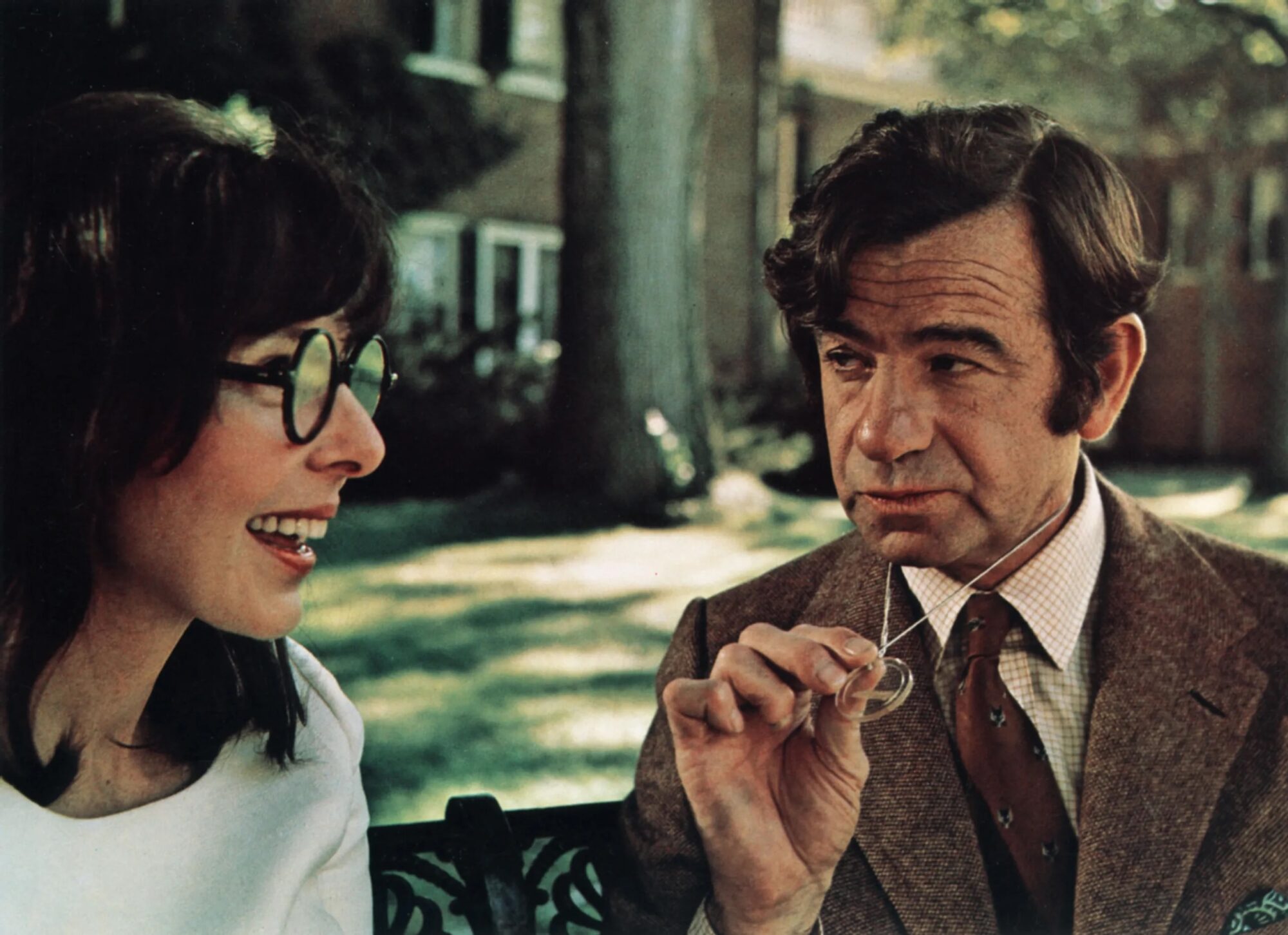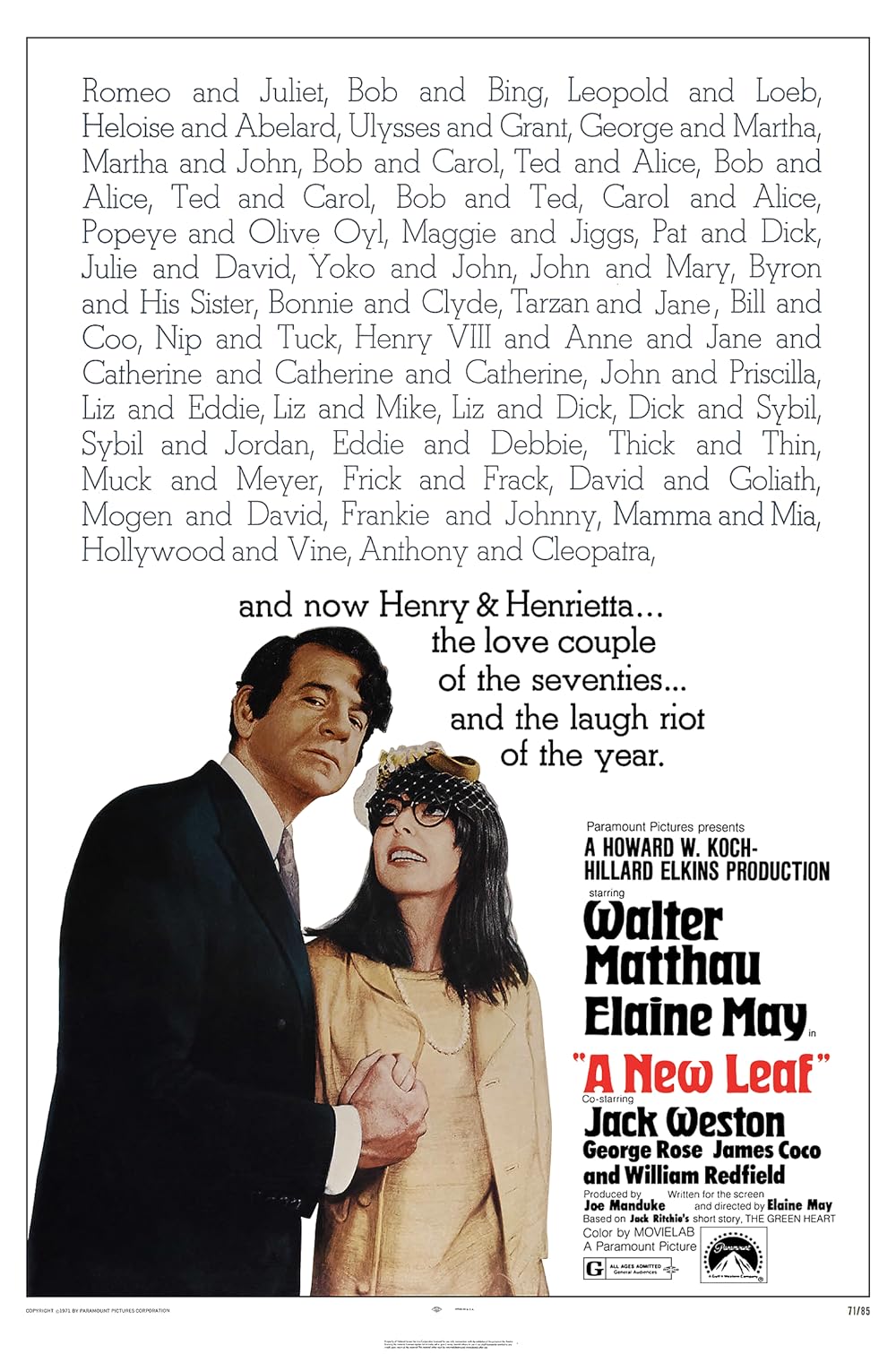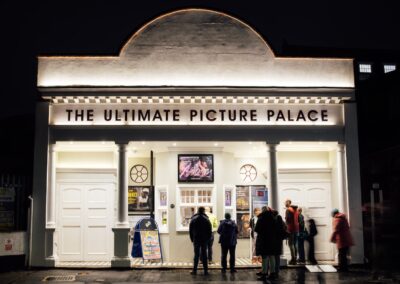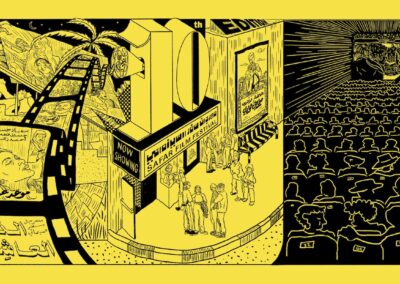Now 91 (and long may she last), Elaine May is a fascinating 1970s Hollywood figure and one of the few (only?) mainstream women directors from the period – 1971’s A New Leaf (which is screening at the UPP in March, as part of the Oxford International Women’s Festival) and The Heartbreak Kid (1972) are both super comedies (in the former, she stars alongside the original “grumpy old man” and surprisingly big star, Walter Matthau and the latter is a difficult to see, bittersweet gem, featuring the always marvellous Charles Grodin; a pre-Taxi Driver Cybill Shepherd and May’s daughter Jeannie Berlin); Mikey and Nickey (1976) with Peter Falk and John Cassavetes might well be worth re-discovering (although I never much cared for it) and, of course, she’d go onto direct Warren Beatty and Dustin Hoffman in the notorious flop Ishtar in 1987. She also had a hand in writing Beatty’s Heaven Can Wait in 1978 (for which she received an Oscar nomination, alongside co-writer Buck Henry); Reds in 1981 and Tootsie for Sidney Pollack in 1982 (both uncredited).
May had first taken to the stage, aged three, with her father as part of his travelling Yiddish Theatre Company and in 1955, whilst at the University of Chicago, she joined the fledgling Compass Players, where she first met director, Mike Nichols with whom she would work for the next five years. Their stand up comedy skits won them a Grammy Award in 1960 with American audiences, especially, lapping up their sophisticated, satirical improvisations. The duo would split at the height of their fame, however, with Nichols pursuing a successful career as a theatre and film director (best known for Who’s Afraid of Virginal Woolf? in 1966; The Graduate in 1967 and Catch 22 in 1970) and May turning her hand towards acting and writing for the stage.
In 1971 she made her first movie as a director, the afore-mentioned A New Leaf (in which she also starred – saving the studio several thousands of dollars) turning in a massively over-budget three hour cut, which Paramount immediately cut to 100 minutes. The studio executive responsible for the butchery was none other than Godfather producer Robert Evans and, in spite being nominated for a Golden Globe for her performance, May apparently lobbied, unsuccessfully, to get her name removed from the credits.

At the time, Walther Matthau, who was given the leading role in the film, was a huge box office draw, having starred in, amongst others, Billy Wilder’s The Fortune Cookie in 1966; the smash hit The Odd Couple in 1968 and musical Hello Dolly with Barbra Streisand in 1969. A New Leaf, however, was a flop and may well have played its part in explaining Matthau’s choice of grittier roles in the 1970s (the eponymous anti-hero of Don Siegel’s brilliant heist drama Charley Varrick; the maverick cop in The Laughing Policeman and foil to Robert Shaw’s subway train hijacker in The Taking of Pelham One Two Three).
Also along for the ride are Jack Weston (who would go on to appear in the Burt Reynolds/Raquel Welch Ed McBain cop drama Fuzz in 1972 and Dick Lester’s campy gay bath comedy The Ritz in 1986) and James Coco, who also later starred alongside Raquel Welch in James Ivory’s James Moncure March poem adaptation The Wild Party in 1975.
The film was shot by Gayne Rescher (who would end his career as cinematographer on Star Trek II: The Wrath of Khan in 1982); includes music by Count Basie’s arranger Neal Hefti (best known, at the time, for composing the much-loved theme tune to the Adam West starring TV series Batman) and its editors were Don Guidance and Frederic Steinkamp, both of whom would go on to do good work for Sydney Pollack, including man-in-the-wilderness western Jeremiah Johnson in 1972; paranoid thriller Three Days of the Condor in 1975 (both starring Robert Redford) and Tootsie in 1982.
Based on a short story by the prolific crime writer Jack Ritchie, which May first came across in an Alfred Hitchcock Mystery Magazine, A New Leaf tells the blackly comic tale of a down on his heels playboy Henry (Matthau) who manipulates a socially awkward botanist-heiress Henrietta (May) into a toxic relationship and marriage. The tagline listed several other “great couples” from literature, film and real life (including Romeo and Juliet, Bob and Bing, Popeye and Olive Oyl, Bonnie and Clyde, Liz and Dick and Hollywood and Vine) suggesting that Henry and Henrietta are “the love couple of the 70s… and the laugh riot of the year.”

As already noted, in spite of expectations and good reviews, the film failed to find an audience, although it has since acquired cult status. In this reviewer’s opinion, it remains a hilarious and eventually touching “cynical” comedy; acted with wit and charm by its two leads, with some strong directorial features. May reveals herself to be a gifted, intelligent and witty writer and, whilst she may have preferred the longer cut, the film does not feel like a butchered mess.
Whilst it’s probably easily available on Prime Video, the DVD has never been released in the UK, so the screening at the UPP provides you with a rare chance to see not only one of the finest “unsung” Romantic films of the 1970s, on the big screen, but also the opportunity to reappraise the work of one of its few women directors. Elaine May, according to the actor Richard Burton was “too formidable, one of the most intelligent, beautiful and witty women I had ever met, I hoped I would never see her again.”
From 1999 until his death in 2019, May was “companion” to film director Stanley (Singin’ in The Rain) Donen; she worked with Woody Allen on both Small Time Crooks in 2000 and his ill-fated Amazon TV series Crisis in Six Scenes and, aged 86, won a Tony Award for Best Actress in a play for her performance on Broadway as a Dementia sufferer in Kenneth (Manchester By the Sea) Lonergan’s play The Waverly Gallery.
In 2021, she was awarded an Honorary Academy award for her “bold, uncompromising approach to filmmaking.”
Although his opinion counts for very little these days, Allen described her as “a genius and I don’t use that word casually,” and it says much of a decade best known for its “movie brats” (all white, bearded and very male) that this singularly talented female film maker is not better known than she is and, had she had been a man, would Ishtar, which cost over $50 million to make but took a mere $14 million at the box office, have been quite so maligned? After all, Michael Cimino went onto make at least four move movies after the disaster that was Heaven’s Gate, which cost $44 million but only took $3.5.
May, on the other hand, never directed again.
Click here to book tickets to our Sunday 3rd and Monday 4th March screenings of A New Leaf.
Dr Andrew C Webber is a Film teacher and examiner with over 37 years’ experience. He currently contributes to both the Cinema of the 70s and 80s magazines (available on Amazon); cassette gazette fanzine (available from cassette pirate on e-bay) and the Low Noise music podcast available on Spotify and Apple podcasts.


